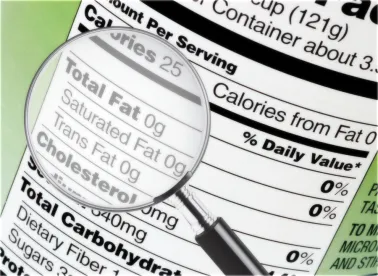On November 19, 2015, the Food and Drug Administration (FDA) issued a final guidance outlining its recommendations to food companies on the voluntary labeling of foods as to whether a food is or is not derived from genetically engineered (GE) plants (final GE Labeling Guidance). In its final GE Labeling Guidance, FDA continues the general principles it articulated in its 2001 draft GE Labeling guidance and its 1992 statement of policy on GE foods. FDA reiterates its position, first set forth in 1992, that, as a class, GE foods do not differ in any meaningful or uniform way from foods not derived from GE plants, nor do they present any different or greater safety concerns than foods not derived from GE plants. The agency notes that genetic engineering is a process for developing new plant varieties, but the use of this process does not necessarily have any effect on the attributes of the food derived from such plants.
FDA issued it final GE Labeling Guidance just one week after it publicly requested information and comments on the use of the term “natural” in food labeling, including whether “natural” claims should be allowed be made on foods that contain GE ingredients.
This alert provides a high-level summary of FDA’s final GE Labeling Guidance, FDA’s request for comments on “natural” claims, and other recent developments in GE labeling.
Highlights of FDA’s Final GE Labeling Guidance
FDA’s final GE Labeling Guidance reflects FDA’s current recommendations on how food producers who wish to include voluntary claims on foods not derived from GE plants should draft their claims so they are truthful and not misleading:
-
Claims should use the terms “not bioengineered,” “not genetically engineered,” and “not genetically modified through the use of biotechnology” in place of “Non-GMO” to convey that a food was not derived from GE plants, because these terms are more scientifically accurate. FDA states, however, that it does not intend to take enforcement action solely because a claim uses the acronym “GMO.”
-
Claims should not use the terms “GMO free,” “GE free,” “does not contain GMOs,” and “non-GMO” because these claims convey that a food is “free” of GE ingredients and “free” conveys a total absence of GE material.
-
Claims should not suggest or imply that a food is safer, more nutritious, or otherwise has different attributes than other comparable foods solely because the food was not genetically engineered, or FDA may find the claim to be misleading. In addition, FDA may consider a claim to be misleading if it fails to reveal certain material information (e.g., a prominent statement that a minor food ingredient was not produced with GE if consumers could be misled to believe that the entire product was not produced with GE or a statement that a food was not produced with GE when the food is incapable of being produced with GE).
-
Claims must be substantiated, taking into consideration the specifics of the claim, which may include:
-
Documentation of handling practices and procedures, including segregation procedures. Manufacturers that have control over production of raw commodities should document whether or not the raw commodities are produced using GE, including segregation procedures. Other manufacturers may rely on certifications or affidavits from suppliers in the food production and distribution chain.
-
Compliance with USDA organic certification requirements. A claim that a food is not derived from GE plants can be substantiated by records demonstrating compliance with the U.S. Department of Agriculture’s (USDA’s) certified organic regulations.
-
Use of validated test methods. Validated analytical methods may be useful in confirming the presence of GE material, but most often will likely not be sufficient to substantiate that a food is not derived from GE plants, particularly highly processed foods such as oils.
-
FDA’s Request for Comments on the Use of “Natural” in Food Labeling
FDA’s longstanding policy for using “natural” claims in food labeling, which it first articulated in 1991, is that nothing artificial or synthetic (including colors regardless of source) is included in, or has been added to, the product that would not normally be expected to be there.
FDA, however, has never defined “natural,” nor has FDA established requirements through regulation for the use of “natural” in food labeling. In recent years, FDA has received a number of citizen petitions requesting that FDA define “natural,” and has received requests from federal courts asking it to respond to questions about “natural” claims being disputed in litigation.
On November 12, 2015, in response to all these inquiries, FDA published a notice in the Federal Register requesting public comments and other information on use of the term “natural” in food labeling, including when, if ever, the term would be false or misleading.5 FDA asked specifically for comments on: use of “natural” in the labeling of foods derived from GE; whether and how consumers associate the term “natural” with the terms “organic” or “healthy”; whether use of “natural” should be allowed only in the labeling of single ingredient foods; and other issues related to processing of foods and ingredients. The comment period ends February 10, 2016.
Other Developments in GE Labeling
FDA’s issuance of its final GE Labeling Guidance comes amid other developments in GE labeling, including:
-
Vermont mandatory GE labeling law. Slated to go into effect July 1, 2016, the Vermont law establishes mandatory labeling and recordkeeping requirements that apply to all packaged foods that are produced with GE (as defined in that law) and offered for retail sale in Vermont. Primarily, unless an exemption applies, manufacturers must label GE foods as “Produced with Genetic Engineering,” and cannot use the term “natural” or similar words on the label of GE foods. In April 2015, a federal judge denied a food industry effort to suspend enforcement of the Vermont law. Although that decision is currently being appealed, there is no assurance at this point that a court decision will prevent the Vermont law from going into effect next year.
-
Pending federal legislation. The Safe and Accurate Food Labeling Act of 2015 would: establish national standards for voluntary claims that a food is or is not derived from GE; direct FDA to define the term “natural”; and preempt any existing and future state and local GE labeling requirements. The bill passed the House in July 2015, but has not passed the Senate.
-
FDA denial of petition for mandatory GE labeling. In November 2015, FDA denied a petition from the Center for Food Safety asking FDA to require mandatory labeling of GE foods. According to FDA, the petition did not provide sufficient evidence that, as a class, foods derived from GE differ from foods derived from non-GE in any meaningful or uniform way, or present any different or greater safety concerns.
-
FDA approval of GE salmon. Also in November 2015, FDA approved AquaBounty Technologies’ new animal drug application for AquAdvantage Salmon, a GE salmon.8 In this draft guidance, FDA concluded that GE salmon is not materially different from other salmon in a manner that would require additional labeling information. The comment period for the draft guidance ends on January 25, 2016.








 />i
/>i

